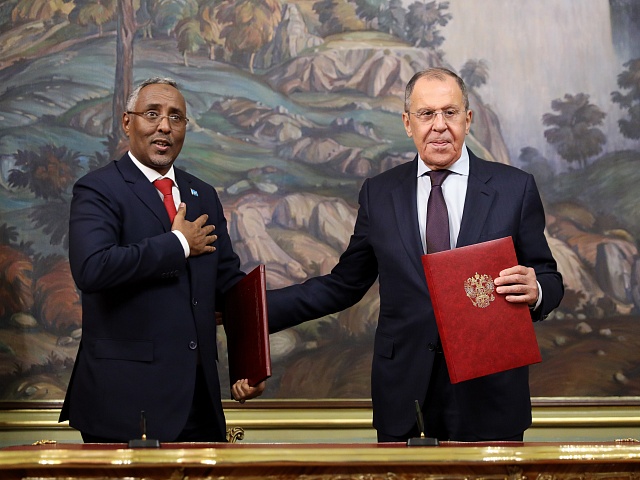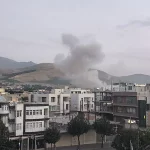Somalia’s deepening ties with Russia are more than transactional; they reflect frustration with existing security frameworks and a global contest for influence in Africa. For Moscow, Somalia is both a symbolic prize and a strategic outpost. For the West, this pivot must be read as a wake-up call: neglect and conditionality can drive even fragile partners toward revisionist powers. Whether this relationship evolves into a full military alliance or remains a bargaining chip, it marks a crucial turning point in the geopolitics of the Red Sea.
In 2025, Somalia’s growing political and military engagement with the Russia signals a dramatic shift in the Horn of Africa’s geopolitical alignment. Once a stronghold of Western influence, Somalia’s pivot toward Moscow highlights Moscow’s broader strategy to reassert itself in East Africa amid weakening U.S. and EU engagement..
1. Background: A Strategic Realignment
Since the Cold War, Somalia has oscillated between Soviet, American, and Gulf patronage. Today’s deepening ties with Russia follow a series of diplomatic overtures:
- Somali and Russian foreign ministers met multiple times in 2023–2025.
- Reports emerged of Russian military advisors arriving in Mogadishu.
- Russian investment discussions focused on port modernization (Mogadishu and Berbera), oil exploration, and grain supplies.
- A potential arms deal and naval cooperation agreement are in development.
2. Drivers Behind Somalia’s Pivot
A. Security Vacuum and Military Needs
Somalia, facing persistent threats from al-Shabaab and inter-clan militias, seeks:
- Weapons not tied to Western human rights conditions.
- Training and logistics support as AMISOM/AU forces draw down.
- Naval capacity building to secure its EEZ against piracy and illegal fishing.
Russia offers fewer constraints, a rapid arms supply chain, and military instructors — attractive amid delays from Western partners.
B. Disillusionment With the West
Somalia perceives:
- Conditional aid and political pressure from the U.S. and EU.
- Decreasing Western commitment to long-term security.
- Frustration over sanctions on Somali warlords now integrated into politics.
In contrast, Russia emphasizes “non-interference and sovereignty,” resonating with Somalia’s leadership.
C. Geopolitical Bargaining
By engaging Russia, Mogadishu seeks:
- To balance Gulf and Western influence, especially amid UAE’s controversial port operations in Berbera.
- Leverage in negotiations with China, Turkey, and the West.
3. What Does Russia Want in Somalia
A. Strategic Foothold in the Red Sea
- Access to Somali ports gives Russia naval reach from the Indian Ocean to the Suez Canal, complementing its presence in Sudan and possibly Eritrea.
- It creates a southern pressure point against U.S. and French bases in Djibouti.
B. Resource Access
- Somalia’s oil and gas potential — both offshore and onshore — remains underexplored.
- Fisheries, minerals, and agricultural land are appealing amid Russia’s food and energy diplomacy strategy in Africa.
C. Symbolic Value
- Somalia represents a former Soviet client state — re-engagement feeds the Kremlin’s narrative of global resurgence.
- It allows Moscow to present itself as a counterweight to Western neo-colonialism in Africa.
4. Regional and Global Reactions
A. United States and European Union
- Concerned about destabilization and the erosion of norms around arms embargoes.
- Likely to tighten aid conditionality, but at the risk of losing influence.
- Washington may consider re-engaging more robustly via AFRICOM or increasing cooperation with Kenya and Ethiopia.
B. Turkey, UAE, and Qatar
- Turkey has trained Somali forces and built significant infrastructure; it sees Russia as an encroaching competitor.
- UAE and Qatar may counter Russian influence by increasing economic entrenchment or backing rival political factions.
C. Ethiopia and Kenya
- Russia’s military presence may shift power balances in the Horn.
- Ethiopia, which has its own warming ties with Russia, may welcome coordination — but Kenya is likely alarmed.
D. China
- May tolerate Russian activity as long as it does not disrupt the maritime Silk Road or Chinese economic interests.
- However, overlapping ambitions in East Africa could evolve into subtle Sino-Russian competition.
5. Implications for Regional Stability
A. Increased Militarization
- Russian arms shipments could escalate intra-state or clan conflicts, especially if distributed unevenly.
- Al-Shabaab may exploit any governance breakdowns resulting from Moscow’s support of rival factions.
B. Erosion of Western Leverage
- If Somalia aligns militarily with Russia, NATO maritime and anti-piracy coordination could falter.
- EU migration policies may suffer if instability increases.
C. New Axis in East Africa?
- Somalia’s move, combined with Sudan and CAR’s orientation toward Russia, may mark the emergence of a Russia-aligned bloc from the Sahel to the Horn.
6. Scenarios
| Scenario | Description | Probability | Consequences |
| Strategic Alliance | Somalia allows Russian military base access | Medium | NATO outflanked in Horn; Turkey/UAE reevaluate strategies |
| Transactional Deal | Limited arms-for-access agreement | High | Regional militarization; Gulf states counterbalance |
| Backlash and Reversal | Somali domestic backlash halts Russia deal | Low | Political instability; opportunity for U.S. re-engagement |
7. Policy Recommendations (U.S. and Allies)
- Re-engage Somalia through flexible aid structures, reducing overly rigid conditions.
- Offer targeted military cooperation, including coastal defense and counterterrorism.
- Strengthen coordination with Turkey and Kenya, ensuring a regional front.
- Monitor Russia’s naval logistics activities, especially in Berbera and Kismayo.
Invest in public diplomacy to reframe Western involvement as cooperative, not coercive.
Deepening ties between Somalia and Russia could have serious negative consequences, both for Somalia internally and for the broader region and international order. Here’s a breakdown of key negative impacts:
🔻 1. Destabilization of Somalia’s Internal Security
- Russian arms inflows could bypass oversight, empowering specific clans or political factions, risking a resurgence of inter-clan conflict.
- Al-Shabaab may exploit growing divisions between Russian-backed factions and others, increasing terrorist attacks or launching propaganda against “foreign occupiers.”
- The arrival of Russian military advisors or mercenaries (e.g., Wagner or its successors) could undermine Somali sovereignty and human rights, as seen in CAR and Mali.
🔻 2. Undermining of Western and AU Security Architecture
- Somalia risks losing Western aid and training programs (from the U.S., EU, Turkey, UK), which are conditional on transparency and human rights standards.
- Russia’s presence could clash with AMISOM/AU forces, complicating joint operations and reducing coordination against terrorism.
- NATO’s maritime missions near the Horn (anti-piracy, trade route security) may be restricted or politically challenged if Russia gains port access (e.g., Kismayo or Berbera).
🔻 3. Increased Militarization of the Horn of Africa
- Ethiopia, Kenya, Djibouti, and the UAE may respond to Russia’s presence with their own military buildups, increasing tensions in an already volatile region.
- The Horn could become a new Cold War-style battleground of proxy competition, including Russia–Turkey, Russia–UAE, and possibly Russia–China tensions.
🔻 4. Risk of Becoming a Proxy Battleground
- Somalia may lose agency in decision-making as great powers compete on its territory.
- A Russian presence would likely attract U.S. countermeasures, such as sanctions or special operations, increasing pressure on Somali institutions.
🔻 5. Reputational and Diplomatic Isolation
- Alignment with Russia in 2025, amid its full-scale war in Ukraine and global sanctions, risks alienating Somalia from the EU, G7, and key donors.
- The IMF, World Bank, and EU may reconsider debt relief or development grants, leading to fiscal strain and public unrest.
- This may also weaken Somalia’s position in regional organizations (e.g., IGAD, AU) where pro-Western states dominate.
🔻 6. Long-Term Economic Dependency and Exploitation
- Russia may offer infrastructure investment and arms, but usually with opaque contracts and long-term dependency.
- Somali natural resources (oil, gas, fisheries, minerals) could be exploited through unbalanced or corrupt deals, as seen in other African states under Russian influence.
🔻 7. Encouragement of Authoritarianism
- Russian influence often rewards centralized, unaccountable leadership in client states.
- Somalia’s fragile democracy may erode if the government feels it has an alternative to Western oversight and conditionality.
- Political opposition, civil society, and the free press may come under pressure if Russia backs an entrenched ruling elite.
🧭 Summary Table: Negative Impacts
| Domain | Consequence |
|---|---|
| Internal Stability | Armed factionalism, Al-Shabaab exploitation |
| Governance | Weakening of democratic norms, corruption increase |
| Security Cooperation | Fracturing of AU/NATO/U.S. missions |
| Regional Dynamics | Military competition, destabilizing neighboring states |
| Economic Impact | Exploitation of resources, loss of Western aid |
| Global Standing | Sanctions, loss of international financial support |
If Somalia continues deepening its alliance with Moscow without balancing Western, Gulf, and African relations, it risks becoming a fragile outpost of Russian influence at the expense of its own long-term development and sovereignty.
Somalia’s deepening cooperation with Russia poses several direct and indirect threats to the United States, particularly in terms of strategic positioning, counterterrorism, regional stability, and the global influence contest. Here’s a structured assessment:
1. Strategic Threats to U.S. Military and Naval Presence in the Region
Red Sea–Horn of Africa Chokepoint
- Somalia borders the Bab el-Mandeb Strait, a vital route connecting the Red Sea to the Indian Ocean. U.S. naval forces rely on freedom of navigation through this corridor.
- A Russian military footprint in Somalia — especially if it includes port access — could complicate or constrain U.S. naval operations, especially those launched from Djibouti (Camp Lemonnier, the only permanent U.S. base in Africa).
⚓ Naval Encirclement Risk
- Russia already has or is pursuing naval access in Sudan (Port Sudan), Eritrea (Assab), and potentially Madagascar.
- A port deal in Somalia (Mogadishu, Berbera, or Kismayo) could complete a strategic arc that allows Russia to challenge U.S. maritime dominance in the western Indian Ocean.
2. Erosion of U.S. Counterterrorism Capabilities
- The U.S. relies on military, intelligence, and drone coordination with Somali and AU forces to target al-Shabaab.
- Russian involvement could:
- Undermine trust and operational transparency.
- Lead to Somali refusal of U.S. drone overflight or SOF (Special Operations Forces) access.
- Enable Russian-supported factions to divert security resources or intelligence away from counterterrorism and toward political consolidation.
🔴Worst-case scenario: Russia may gain access to sensitive U.S. operational data or leverage Somali political elites to push the U.S. out entirely, as it did in Mali and the CAR.
3. Intelligence and Strategic Access Risks
- A Russian presence in Somalia would extend Moscow’s signals intelligence (SIGINT) and human intelligence (HUMINT) reach across:
- U.S. military installations in Djibouti.
- Naval movement between the Mediterranean, Gulf, and Indian Ocean.
- Western private shipping and drone surveillance.
Russian intelligence bases in Africa often double as electronic surveillance outposts — targeting both Western military and commercial communications.
4. Undermining of U.S. Influence and Development Efforts
- Russia’s influence typically comes without demands for democracy or transparency — allowing kleptocrats to reject Western aid conditions.
- If Somalia turns to Russia for weapons, infrastructure, or political support:
- The U.S. loses leverage on governance, human rights, and security reform.
- It enables a more authoritarian political environment hostile to U.S. values.
This weakens USAID programs, public diplomacy, and Washington’s soft power in the region.
5. Reinforcement of a Global Anti-Western Bloc
- Russia is building an “Axis of Influence” in Africa, with support from Mali, Sudan, CAR, Burkina Faso — now possibly Somalia.
- These states:
- Offer Russia UN General Assembly votes, undermining U.S.-led resolutions (e.g., on Ukraine, sanctions).
- Support anti-Western narratives in African Union or Arab League meetings.
Somalia shifting into this camp would tilt regional norms against U.S. leadership in global institutions.
6. Precedent for Other Fragile States
- Somalia is a litmus test: if a fragile state can gain Russian arms, advisors, and money without suffering serious consequences, others may follow — including:
- Chad, DRC, South Sudan, or even parts of East African Community (EAC).
- This could weaken U.S. influence across multiple African subregions, especially if the Wagner Group or its successors entrench further.
Summary: U.S. Threat Matrix
| Domain | Threat from Somalia–Russia Cooperation |
|---|---|
| Military/Naval | Disruption to Red Sea/Indian Ocean operations; Russian port access |
| Counterterrorism | Degraded CT intelligence, drone access, and trust with Somali partners |
| Intelligence/Security | SIGINT and HUMINT proximity to U.S. bases; Russian surveillance |
| Geopolitical Influence | Erosion of Western leverage; anti-U.S. bloc building |
| Democracy/Development | Loss of governance leverage; authoritarian consolidation |
| Global Institutional Power | Somali votes and positioning could weaken U.S. leadership in UN/AU |
While Somalia is not a core military partner of the United States, its strategic location and symbolic position as a fragile recovering democracy make it a valuable node in the contest for influence. Russia’s deepening ties threaten to push the Horn of Africa into Moscow’s orbit, thereby undermining U.S. strategic objectives in Africa, the Middle East, and maritime trade routes.
Upcoming elections in Somalia could significantly shape foreign policy, including its alignment with Russia. Here’s how electoral dynamics may influence that relationship:
1. Electoral Uncertainty and Russian Engagement
- Somalia’s federal elections, planned for May 2026, are already delayed and contentious, with fears of institutional collapse if not held.
- Political actors under pressure may seek external support. Kremlin engagement—through military or diplomatic backing—can be used by Somali leaders to legitimize power grabs or assert sovereignty against both domestic rivals and Western demands.
2. Constitutional Crisis & Alignment Shifts
- President Mohamud’s push for expanding presidential power and centralizing control inspired backlash from regional states
- Facing opposition, Mogadishu may lean on Russian support to defend a strong executive or resist federal decentralization. Russia’s doctrine of “non‑interference” offers cover compared to Western partners demanding democracy and pluralism.
3. Regional Elections and Federal Balance
- Regions like Puntland (Mayoral/presidential vote recently held) set examples .
- Federal elections overshadowed by these local contests may create uneven alliances. Russia could exploit fragmentation by forging ties with states hostile to Mogadishu’s center, further complicating national cohesion.
4. Foreign Policy Instruments in Election Campaigns
- Somali politicians may use foreign partnerships as campaign assets:
- Pro‑Russian figures might highlight arms or security assistance Moscow provides.
- Pro-Western candidates could contrast Russia’s ties with democratic support from U.S., EU, or Turkey.
- Media narratives in the run‑up to elections may feature Russian involvement as proof of Mogadishu’s autonomy or, conversely, as a threat to democratic ideals.
5. International Funding Standoff & Bargaining
- Russia may leverage electoral uncertainty to pressure Western aid conditionalities or gain military footholds in return for election funding or security guarantees.
- Somali elites could use Russian offers as leverage in negotiations with donors, intensifying competition between Moscow and the West for influence.
While there’s no direct sign elections already locking Somalia into Russia’s orbit, the post‑electoral power dynamics, combined with Somalia’s constitutional crisis, create fertile ground for increased Russian leverage. Tensions over control, central power, and foreign alliances during this electoral cycle could tip the trajectory—pushing Somalia either toward greater autonomy under Moscow or back into Western-aligned aid and security frameworks.
ELECTORAL OUTCOME SCENARIOS AND FOREIGN POLICY IMPACT
| Scenario | Description | Effect on Russia’s Role | Implications for U.S./EU Policy |
|---|---|---|---|
| 🔵 Scenario 1: Centralized Presidential Victory | President Hassan Sheikh Mohamud consolidates power with a strong electoral win and imposes centralized authority over federal states. | Russia may be welcomed as a counterbalance to U.S./EU pressures on governance, rights, and decentralization. Kremlin gains leverage via arms deals and port access. | U.S./EU risk losing influence. Must decide whether to prioritize security (e.g., CT ops) or press for democratic norms. Conditionality may backfire. |
| 🟠 Scenario 2: Fragmented Federal Outcome | Opposition and federal states (e.g., Puntland) gain local electoral victories, pushing back against Mogadishu’s centralization. | Russia could exploit tensions by offering support to both Mogadishu and breakaway states, undermining national cohesion. Potential for Wagner-type entrenchment. | EU and U.S. must reinforce federal institutions, possibly through UN or AU mediation. Support local elections and decentralized governance. Increase anti-Russian narrative with regional elites. |
| 🟢 Scenario 3: Pro-Western Reformist Coalition Wins | A reformist bloc (possibly technocratic or youth-oriented) wins with Western support, pledging accountability and democratic renewal. | Russia’s influence stalls or retreats. Public backlash against authoritarian external actors (e.g., Russia, China). | Opportunity for U.S./EU to invest heavily in stabilization, governance, and debt relief. Bolster civil society and restore military cooperation on terms favoring democracy. |
| 🔴 Scenario 4: Electoral Crisis or Postponement | Elections are postponed, rigged, or delegitimized. Protests and instability rise. A state of emergency declared. | Russia steps in with political and security support for ruling elites, offering military advisors, media support, and diplomatic cover at the UN. | Urgent Western reaction needed: sanctions, conditional aid freeze, AU/IGAD diplomatic surge. Increase support to media, local governance, and election observers. |
🔍 Key Variables to Watch
- Russian Military Presence: Watch for any deals granting Russia access to Somali ports (e.g., Berbera, Kismayo).
- Arms Transfers: Sudden increases in Russian arms shipments or training may signal a long-term military alignment.
- Information Warfare: Disinformation campaigns favoring pro-Kremlin Somali elites, particularly in Arabic and Somali-language social media.
- Opposition Alignment: Whether key federal states align more with Turkey, UAE, or Western donors to counterbalance Russian ties.
Policy Recommendations for the U.S. and EU
- Scenario-Responsive Strategy: Prepare modular response packages tailored to each outcome (aid increase, sanctions, diplomatic engagement).
- Engage Regional Players: Turkey, UAE, and Qatar also have stakes—coordinate with them to avoid Russia filling power vacuums.
- Support Electoral Integrity: Fund independent observers, civil society, and media ahead of elections.
- Counter Russian Narrative: Highlight Russia’s track record of instability and exploitation in Mali, CAR, and Sudan.




